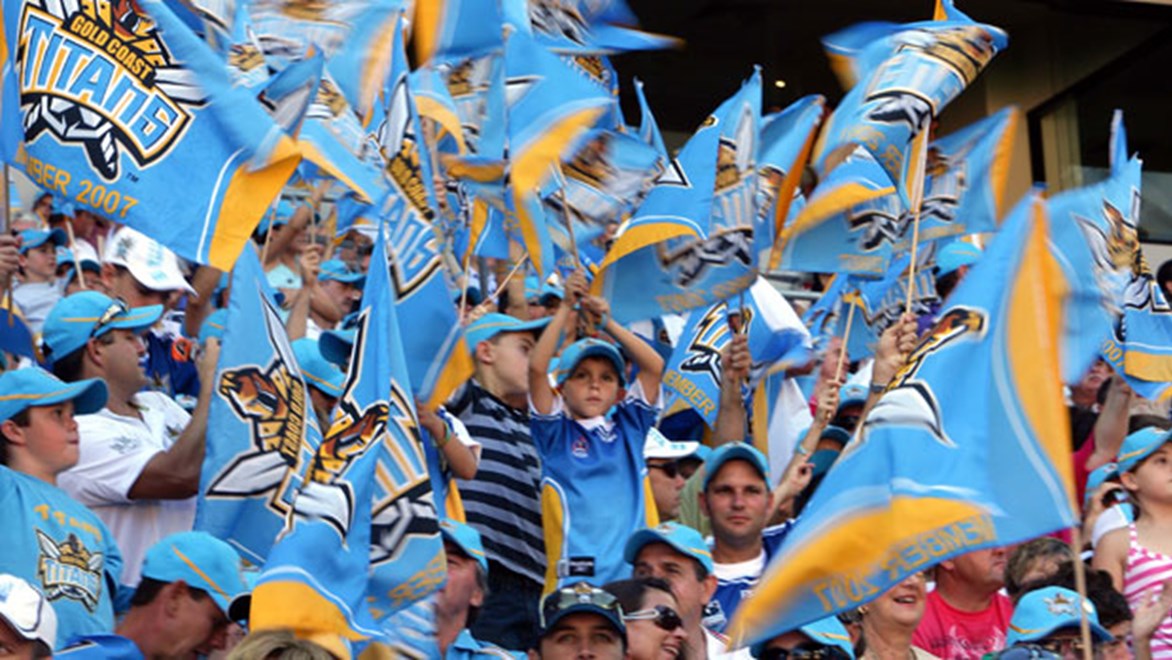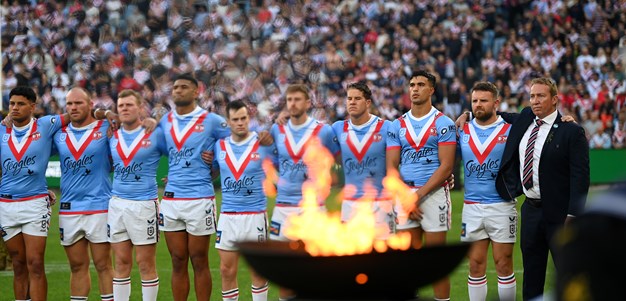

He is the unsung hero behind the early success of the Gold Coast Titans.
After the announcement that the National Rugby League would grant a fourth license to a Gold Coast franchise was met with equal measures of excitement and apprehension given the past failures of the Giants/Seagulls/Chargers, founding CEO Michael Searle and coach John Cartwright knew they needed almost instant success.
They devised a recruitment strategy around identifying more mature players who would not be lured in by the bright lights and temptations associated with the Glitter Strip and then gave head trainer Billy Johnstone the remit to remind the inaugural playing group that this was no Gold Coast holiday.
"He was probably the most important signing that the club made, to be honest with you," Cartwright told NRL.com, 10 years after overseeing the Titans' entry into the Telstra Premiership.
"Billy was very unique in the way that he did things but the players knew exactly what was in front of them.
"There was absolutely no hint of a short-cut in anything that Billy did and he was great for all of the staff really in the way that he approached things."
It's more than a decade since they were first subjected to Johnstone's torturous training methods but foundation players such as Anthony Laffranchi and Nathan Friend have no trouble remembering the pain he put them through.
As he raced the clock to be fit for the club's first game against the Dragons on March 18 following shoulder surgery Friend recalls gruelling three-hour bike rides up and down the Gold Coast while simply muttering 'Groundhog Day' will cause Laffranchi to break out into a sweat.
"Everyone would just drop their bundle and realise that they're going to get flogged for the next 45 minutes," Laffranchi recalls of the infamous call.
"There were an array of things out on the field and they'd go on six-minute cycles. He'd turn up and say, 'We've got three Groundhogs today' or 'I'm feeling lucky, we've only got two Groundhogs today'. You'd hear 'Groundhog Day' and then wait to hear how many Groundhogs we were doing.
"Whilst there was the excitement and the glamour of a new club on the Gold Coast, Billy Johnstone tore that right back to a bare minimum and really flogged the crap out of us to keep us grounded."
Adds Friend: "Billy didn't really say too much but his actions and what he asked of his men were quite physical and very demanding. If anyone had that mentality (of being on holiday) it certainly got washed away within the first week or two.
"Bill was what the Coast needed and it certainly gave the guys the right mindset from then on."
The Titans lost their first game in the NRL 20-18 to a St George Illawarra outfit that had been preliminary finalists the previous year but in the process gave rugby league fans on the Gold Coast reason to believe that this time their team had a future.
The Recruitment
The admission of a Gold Coast team into the 2007 Telstra Premiership was announced by the NRL on May 27, 2005, giving Searle and Cartwright 18 months to assemble their first squad.
Only it didn't, as the NRL insisted that the Titans abide by the same June 30 signing deadline as all other 15 clubs, effectively stripping them of 12 months of active recruitment.
Unwilling to wait until midway through the 2006 season to begin signing players Cartwright and Searle began the recruitment process in secret, hoping that players would stick to their word once the June 30 deadline passed a year later.
"They certainly didn't do us any favours at all in terms of getting a team together and the problem with that was that every player you spoke to wanted to know who you'd signed," Cartwright said.
"It was very hard to get players to put their careers on the line when they don't know who their team-mates are going to be.
"A lot of signings were announced on July 1 so a lot of negotiation must have been done between midnight and midday the next day to get all these deals done that were announced."
Preston Campbell had lived with the Searles when he first moved from Tingha to play for the Chargers and was pin-pointed by Michael Searle as a key first signing; Luke Bailey agreed to join the club on the spot when Cartwright and Searle visited his house in Shellharbour; and Anthony Laffranchi jumped on board midway through 2005 with the Wests Tigers sitting in 13th position on the ladder. They would be premiers four months later.
"There was that inner chatter that we'd be around for four or five years and then be gone again but when we all lobbed on the Coast from all different areas there was this bit of anticipation about the playing group," Laffranchi said.
"There was definitely that element of whether these guys would make this succeed and that probably typified the players that were recruited. It was more about the person than the type of player that we were."
"We decided from the word go that the Gold Coast was probably not the ideal place to bring a group of 25-30 young fellas in and our recruiting was geared towards that," said Cartwright.
"We did sign a lot of guys probably at the tail-end of their careers but we had to be successful from the start too.
"The Gold Coast had shown in the past that if you didn't have success they wouldn't come along and watch so we had to hit the ground running.
"We got criticised a little bit for signing guys at that stage of their careers but we had to try and be successful from the word go."
The Build-Up
The Billy Johnstone floggings in many ways masked the inner determination present amongst the inaugural Titans who gathered on November 1, 2006.
To date 115 players have represented the Titans in the NRL but only 17 can say they were part of the first team to take the field wearing the club's colours in a premiership match.
"You wanted to be in that first 17 and over pre-season we had some pretty good battles for positions," said Laffranchi, who now serves as the club's football manager.
"Whilst we didn't win the game it was a bit of a relief to realise that the organisation was up and running and that you were part of that team.
"We wanted to do well those first couple of years and really cement the team here and 10 years on it's still here.
"I feel privileged to be a part of that first game and to still be around the club now in a different role."
"It was awesome," Friend recalled of the energy around the Gold Coast ahead of their first game.
"The sea of yellow and blue was amazing and the media got behind us and there really wasn't any negative feedback.
"All the radio stations were on us and playing on the main stage at Suncorp, you couldn't wish for anything better."
For Cartwright, seeing the team that he and Searle had worked so hard to assemble take the field for the first time remains one of the greatest moments of his esteemed rugby league career.
"As far as a memory in sport, that's a moment I'll never forget, when the boys ran out onto Lang Park for the first game against the Dragons," Cartwright said.
"That game really set the standard for what the team was known as. They played a very good side and fell behind but fought and fought and fought.
"I still remember Matty Rogers streaking down the field in the last minutes thinking we were going to score. He come up with a kick option and the Dragons end up winning by two points.
"Winning wasn't the be-all and end-all that day. Just to see the culmination of so much work and so much money that was spent, to see it all come together on the day is one of my fondest memories of rugby league."
The Fallout
The Titans qualified for the finals for the first time in their third season in 2009 and 12 months later fell one game short of the grand final against their combatants this weekend, the Sydney Roosters.
Injuries and an ageing roster saw the club plummet to claim the wooden spoon in 2011 but it was the failure of the $25 million Centre of Excellence at Robina that sent the club into a tailspin.
By the end of the 2014 season both Cartwright and Searle had been removed from their positions at the club and the scars run so deep that neither will be part of the club's anniversary celebrations this year.
The fallout from the Centre of Excellence debacle was such that it was felt the Gold Coast community would not fully support the Titans until Searle was removed from the club completely, despite the fact that he had campaigned since the removal of the Chargers in 1998 for the Gold Coast to once again have a team to call their own.
"There wasn't a decision that he made in his whole time there that wasn't about what was good for the Gold Coast and what was good for rugby league in the area," Cartwright said of Searle.
"It's really sad for me that he's not still there and involved in a major way because the bottom line is if it wasn't for him it would have been the Central Coast that got accepted that year and the Gold Coast would probably be all AFL now or soccer.
"He was fighting the might of John Singleton and for all money it was going to be the Central Coast no matter what.
"He didn't get involved to make money out of it, it was all about rugby league and it was all about people taking the Gold Coast seriously.
"I hope that's one thing that people take out of what has happened, that there wasn't a decision made that wasn't aimed to make the club successful and to keep an NRL team on the Coast."
As for his own demise, Cartwright says in hindsight he stayed on longer as head coach than he should have and that the way he exited after eight years in charge has left a sour taste that he has not yet been able to rid himself of.
"When I was asked to leave some things that were promised to me didn't eventuate so that's made it very difficult," said Cartwright, who after working as an assistant coach with the Cowboys during their premiership year in 2015 is in his second season as an assistant coach at Manly.
"I probably should have left a few years earlier when I had an opportunity to go but it was my friendship and loyalty to Mike that I stayed.
"Career-wise I had opportunities to leave and in hindsight I probably should have done that but I'm happy that I didn't.
"Loyalty and friendship are more important."



